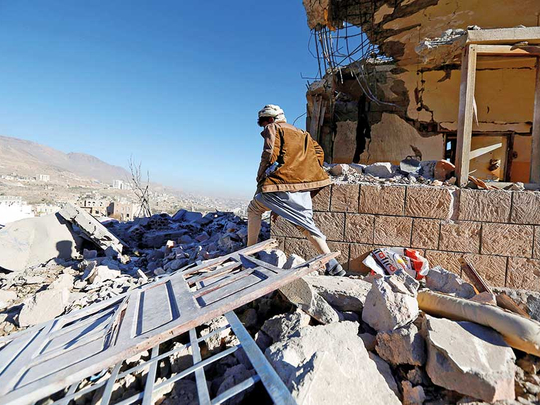
Al Mukalla: A botched attempt by Al Houthis to launch a missile has killed a family of ten members in the Yemeni capital, the state-run Saba news agency said.
On Monday, the Iran-backed militants fired a surface-to-air missile from a park in Sana’a’s Aser district.
The missile failed to reach its target, instead landing on a nearby house, killing ten civilians from one family.
Meanwhile, on the ground, fighter jets from the Saudi-led coalition killed a senior Al Houthi commander and at least two dozen militants in Arhab district, just outside of rebel-held Sana’a, local media reports said.
Al Masdar Online, an independent news site, said that brigadier Ali Makram, the commander of Fareja military camp in Arhab district, his son and 25 Al Houthis were killed when fighter jets struck their gathering in Arhab.
Dozens of other militants who attended the gathering were also injured in the same air strikes.
Makram was apparently regrouping his fighters who suffered setbacks and deaths as government forces advance closer to their positions.
Al Houthis have lost dozens of military commanders in fierce clashes with government forces on all fronts or by Saudi-led coalition fighter jets.
The killing of several senior Al Houthi commanders have severely weakened the militants’ morale and observers believe the developments could lead to the liberation of Al Houthi-controlled Nehim, Bayhan and Red Sea fronts.
On the Nehim front, just outside of Sana’a, fighting raged on Tuesday as government forces pushed forward with their advance in the rugged mountains.
In the Red Sea Khokha district, landmines and IEDs planted by the defeated Al Houthis have killed at least six civilians and injured many others even as dozens of military sappers defused thousands of landmines from the former battlefields.
Al Masdar Online also reported that five civilians were killed and seven others injured when their vehicles drove over an IED planted by Al Houthis on the main road between Khokha and Mokha, two areas that have been liberated by government forces this year. Another civilian on a motorbike was also killed on the same road.
Abu Zara’a Al Mouhrrami, a field commander on the Red Sea front, told Gulf News on Tuesday that Al Houthi landmines are continuing to kill and maim civilians in the area.
“Most of the landmine victims are farmers,” he said, adding that government forces halted their advances north of Khokha region to allow explosives experts to defuse landmines.
The botched missile attempt comes as Al Houthis intensify attacks against supporters of Yemen’s ousted president Ali Abdullah Saleh who was assassinated on December 4 by the militants.
However, earlier this week, Al Houthis were dealt a serious blow when a senior military leader loyal to Saleh, declared his support for government forces and vowed to take part in the current raging war against the Iran-backed Al Houthis.
Major-General Fadhel Yahya Al Qawsi, the former commander of Special Security Forces and a tribal figure from the northern province of Dhamar, decamped to the central province of Marib where he pledged support for the internationally recognised president, Abd Rabbo Mansour Hadi, and urged other army generals who still back Al Houthis to switch sides and head to liberated provinces like Marib and Aden.
Al Qawsi is the most senior military commander yet who has defected from the Iran-backed Al Houthi camp in protest against Saleh’s killing.
Saleh ruled Yemen for more than three decades until he was forced to resign following an Arab Spring uprising in 2011.
He remained in the country, however, and continued to wield power from behind the scenes. In 2014, his forces allied with Al Houthi militia, despite the fact that as president he had gone to war with them.
There had been simmering tensions between the two awkward allies in the past months that boiled over when Saleh, on December 2, officially announced splitting with Al Houthis and vowed to “turn a new page” with the Saudi-led coalition. He was assassinated on the same day.
After suppressing the Saleh-led uprising, Al Houthis launched mass arrests and executions targeting military commanders and politicians who backed Saleh.
Sana’a residents say they are living in a constant state of fear amid a draconian crackdown.
Dozens of senior members of Saleh’s General People’s Congress and military officers have escaped to Marib and Aden.
Internationally recognised Yemeni President Hadi came to power in early 2012 after Arab Spring protests ousted Saleh. In 2014, an Al Houthi-led coup placed Hadi under house arrest.
He was able to escape and has since shifted his government’s headquarters to Aden from where he has led an offensive against Al Houthis.
With help from the Saudi-led Arab coalition, the Yemeni army has liberated 85 per cent of Yemeni territory, but Al Houthis still control the capital, Sana’a, and most northern provinces including Hodeida, Ibb, Mahweet, Yareem, Amran, Baydha and Hajja.












